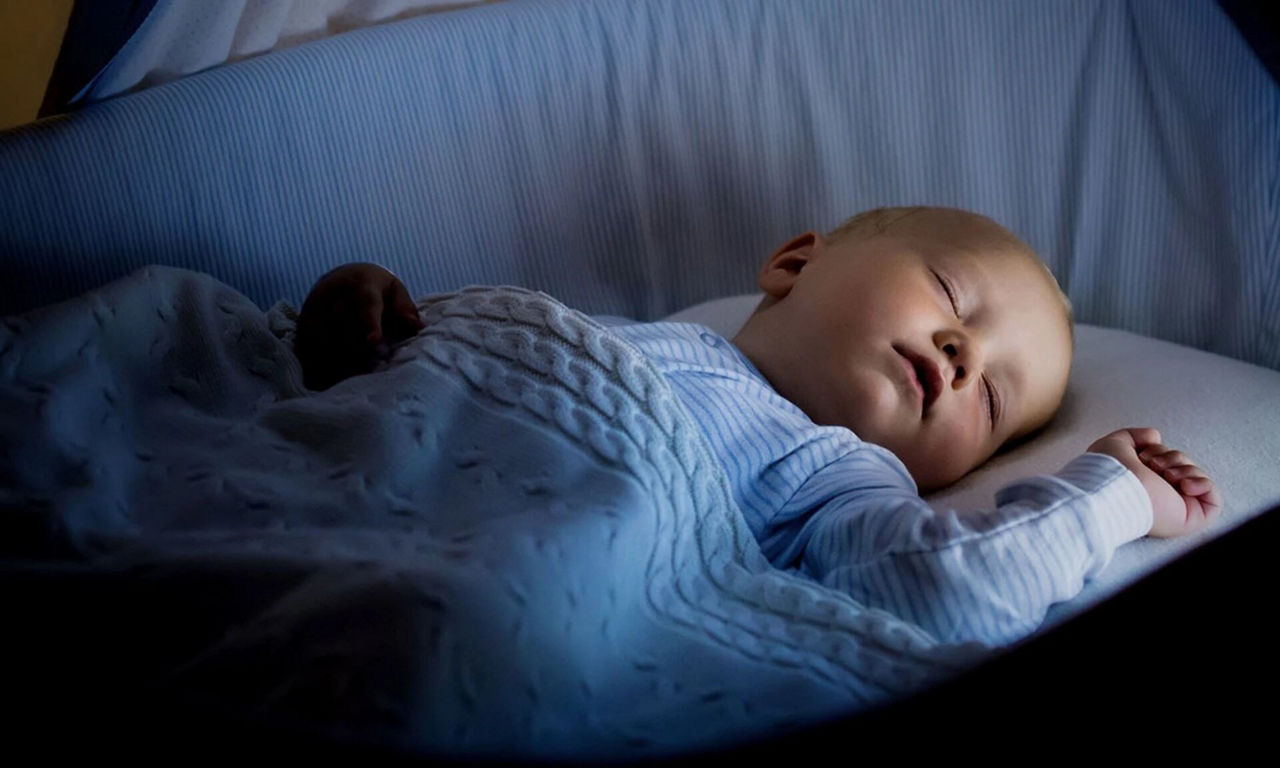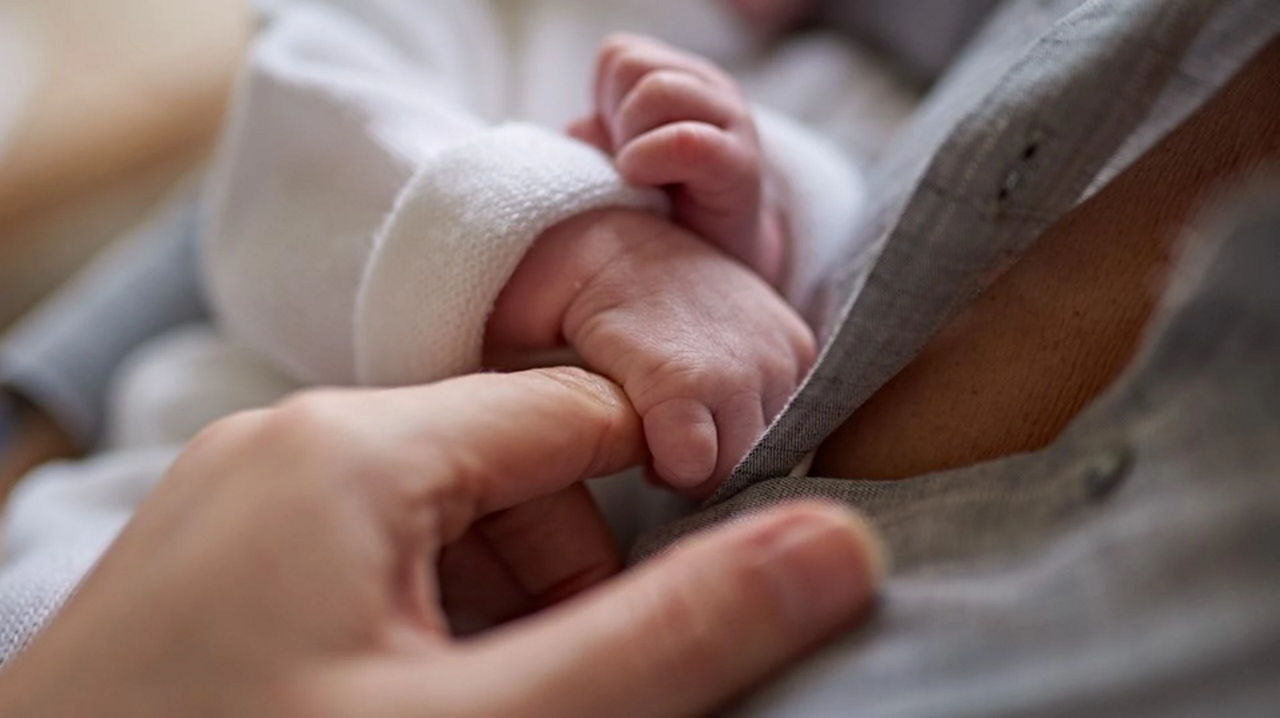How to establish a good baby sleep routine
When it comes to introducing a sleep routine for your baby, it’s important to be realistic in your expectations. When they’re very young, they’ll simply sleep, wake and feed when their instincts tell them to. But after a few weeks, it’s possible to start introducing simple concepts like night and day, which can help when it comes to developing a routine later on.

How to get your baby to sleep through the night
Every baby’s sleeping pattern is different, but whatever schedule your newborn follows, we’ve tips to help them to develop good sleeping habits.
Learn the signs
Overtiredness can make it difficult for your baby to fall asleep, so it's important to know when they're ready for a nap. Eventually you'll know instinctively when they're tired, but until then, signs to look for include crying, rubbing their eyes, pulling on their ears, and faint dark circles under their eyes.
Reinforcing the difference between day and night
For the first few months, you’re on your baby’s timetable so late nights and early starts may become more regular. But in the first weeks, you can start to gently teach them the difference between day and night. In the daytime keep curtains open and go outside for a walk, encourage them to be alert and active and play with them as much as you can.
When night falls, make your house a calmer, quieter place with low lighting and less activity. ‘Blackout’ blinds can help you to control the light even in the height of summer.
It won’t make a difference straight away, but it will help them to learn that night-time is the right time for sleep.
Babies should always be placed to sleep on their back with their feet at the bottom of the cot.
Typical baby sleep patterns
| Age | Total sleep time | Night time | What to look out for |
|---|---|---|---|
| 0-3 months | 15-18 hours of sleep a day | 8-9 hours of sleep broken up by night feeds | Are they hungry or too hot or too cold? |
| 4-12 months | 12-16 hours of sleep a day | 9-10 hours of sleep | They may be hungry or in pain from teething |
| 12-24 months | 11-14 hours of sleep a day | 11 hours of sleep | They may need shorter daytime naps |
Introducing a bedtime routine
At around eight weeks, you may want to start to develop a calm, soothing bedtime routine. A bath, quiet cuddle, story or lullaby at the same time every night can help your baby to understand that it's time to go to bed.
As they get older, you may want to start introducing a daytime routine with a regular pattern of naps to help them – and you – cope with long days. You may think that daytime naps will stop your baby from sleeping at night, but often the reverse is true – it will help them to sleep better. Doing things in the same way every day can help your baby make sense of their world and feel secure.
Baby Sleep during the Clock Change: What’s the deal?
Whilst the thought of springtime and sunnier days is extremely exciting for any parent who has been entertaining their baby indoors for the winter period, it also means that the clocks will be moving very soon! For some parents, this brings about confusion and anxiety over how best to deal with the shift in old time to new time, especially after having recently settled baby into a routine. If that is you – then we have got you!
First of all, let’s consider when this happens and set a little reminder for ourselves. The clocks officially SPRING forward (think lambs, chicks and daffodils!) on the 30th March at 1am, which is essentially the middle of the night. You (and baby) will go to bed on Saturday evening, and wake up on Sunday in the new time. Most phones and digital devices will change themselves, but I always think it is nice to have an analogue watch or clock nearby that you haven’t changed, just so that you can double check 😊
What does this mean for sleep? Well the good news is that baby’s and toddlers are generally very adaptable to time shifts, so we don’t want you to be worrying too much! However there are various approaches you can choose and as time goes by, you will start seeing various ways of doing it popping up on socials and at times it can be confusing. Our biggest tip after 15 years of working with babies and sleep…choose which approach feels right for you, rather than what works for anyone else.
Here are the two main approaches to dealing with the clock change that you can opt for:
The “prep like a boss” approach
For those parents who prefer to feel in control, which admittedly isn’t always easy with a little person – this approach might well suit you best. By prepping in advance, you help your baby or toddler get used to the new time before the clocks actually change. This means starting to shift timings in their routine four days before it actually happens. So this would look like starting on the Wednesday prior to the clock change and on this day, making their usual nap times and feed times 15 minutes earlier. For example, if they usually go to bed at 7pm, putting them down at 6.45pm instead. By moving their feed and nap/bedtimes 15 minutes earlier each day (in the four day run up) it means that by the day the clocks change (Saturday night), you will be putting them to bed at 6pm – which in the new time the following day will actually be 7pm! Therefore waking up on the Sunday with a baby who is already going by the new clock times, rather than the old clock.
The ”do nothing” approach
For those parents who don’t have a routine, or who read the prepping times and can’t quite get their head around the numbers (trust me – I have been a sleep consultant for 15 years and I still have to double check myself on this every single year!), then you may want to go with the doing nothing approach. This means that you will simply just see what happens… If you have a baby who has been an easy sleeper and generally is not impacted by awake windows, or how long they are awake, then this option may actually suit you really well. By doing nothing, you’ll either find that they are just a little more tired on the Sunday as bedtime will “feel” like 8pm, even if they usually go down at 7pm, but otherwise there is no harm in waiting it out and seeing what happens. Much like with jet lag, after a few days things will likely just fall into place.
If neither of the above sounds attractive to you, then meet in the middle and opt for an earlier bedtime by 30 minutes the night before the clock change. As an example, 6.30pm bedtime rather than 7pm. The following day once the clocks have changed, this will be 7.30pm, and you can just opt to put them to bed that little bit later, or just shift it earlier by 30 minutes again so that you are back to your usual 7pm bedtime.
Other things to consider
1. When putting your little one down earlier before the clocks change, they may not be as tired as normal so encourage lots of physical activity like getting outside and crawling, walking or romping around. This is a great way to stimulate them and make them feel more sleepy, ready for that slight shift in bedtime. You could also shave 15 minutes off their final nap to just ensure that they are still as tired as usual.
2. Natural light really helps to sync our body clocks and forms the basis of our circadian rhythm (a fancy term for our internal clocks). Getting out in the sunshine in the morning and late afternoon will always help your little one when it comes to sleep.
3. Remember that as we move into spring, mornings become lighter! Whilst there is a short term period post clock change when it will feel as though early mornings are darker temporarily, we will soon be in bright 5am sunshine territory which is not conducive to your little one sleeping much past then. Black out blinds or curtains can be really helpful in those summer months to help ensure that they sleep for longer and you don’t end up with an early riser!
Baby sleep is of course a complex topic and there is so much more to it than simple clock change shifts, however with knowledge comes power and by understanding the various approaches to the clock change, you can decide which approach works best for you and your little one and feel empowered in your approach. We do hope you enjoy the spring sunshine!
Does infant formula help babies to sleep longer?
There is no evidence to suggest that infant formula makes babies sleep longer.
What are cluster feeds?
‘Cluster feeding’ is a term used to describe a particular pattern of feeding in which a baby feeds frequently – almost constantly – for a few hours in the afternoon or evening until bedtime.
“Babies love being breastfed to sleep and it can be the perfect opportunity for you to bond in your first few months together.”
What are ‘dream feeds’?
Dream feeds may help your baby to sleep longer and can gently introduce a pattern of sleep that’s easier for you. Three or four hours after your baby has gone to bed try semi-waking them for a quiet breastfeed. The idea is to fill your baby’s tummy without them being fully alert and awake; they should drift back to sleep easily after the feed.
What is swaddling?
Swaddling is the term for wrapping your baby securely in a thin blanket, so they feel cocooned and safe. Some babies love the feeling of being swaddled and find it really soothing, while others actively dislike it. If you want to try swaddling, make sure you don’t over-restrict your baby’s hip and leg movements as this can cause hip problems. Also make sure your baby does not get too hot.
Drivetime
You may be tempted to take your baby for a drive or a walk around the block to lull them to sleep. It does work, but be warned, if you do this regularly your baby will come to expect it and it could become a hard habit to break.
Are dummies a good idea?
A night-time dummy can help soothe your baby if they enjoy the comfort of sucking without actually being hungry. Be warned though, dummies regularly fall out of babies’ mouths, so you may be woken up just as much as before by playing ‘hunt the dummy’ in the dark.
Next steps
- In the early days, accept that you will probably not get nearly enough sleep. Rest when you can, sleep when the baby sleeps, and forget about the housework for now.
- Make sure your baby has a safe, comfortable sleeping environment.
- Try and get out of the house every day. Fresh air is good for both you and your baby, and the activity may help them sleep.
- If you’re feeling overwhelmed, make sure you talk to your health visitor as they will be able to give you practical advice and reassurance.
Also talk to a health visitor if you feel your baby is particularly unsettled at night. They can check if your baby is suffering from other issues such as colic.
Co-sleeping or a cot? Find out which is best for your baby.
related articles
Learn more about your baby

Need some help?
You can get quick answers to common questions in our FAQs.
Alternatively, if you need help with general pregnancy or baby advice, or maybe on using or ordering our products - our expert team are always on hand to talk about feeding your baby.




